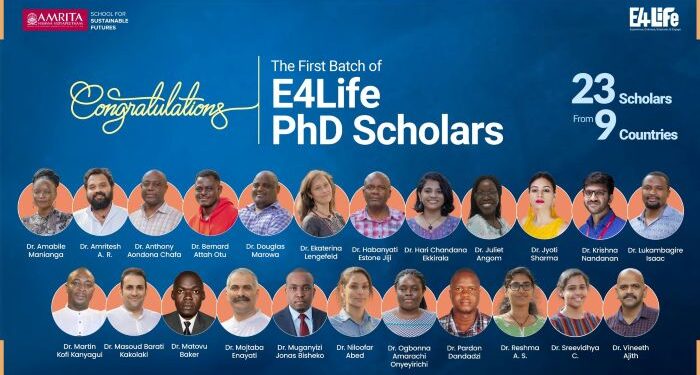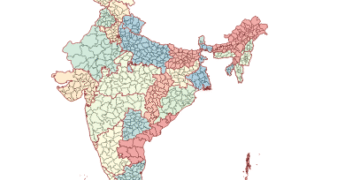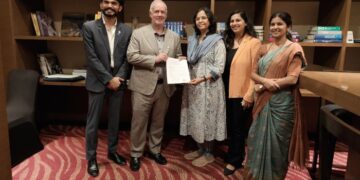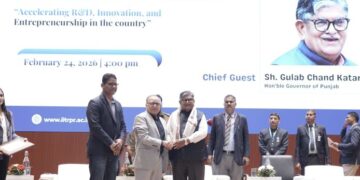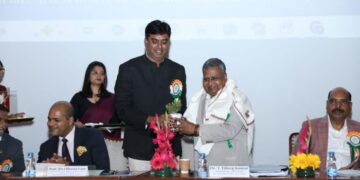The inaugural cohort of 23 exceptional scholars from nine countries, many hailing from underprivileged backgrounds, who were part of Amrita Vishwa Vidyapeetham’s pathbreaking E4Life Ph.D. program in sustainable development were conferred degrees at a special ceremony on Aug 8, 2025.
Graduating scholars have successfully completed their Ph.D.s in critical and socially relevant areas such as climate resilience, tribal welfare, public health, food security, gender equity, and sustainable agriculture. This first graduating class includes students from India, Zambia, Nigeria, Zimbabwe, Uganda, Ghana, Iran, Tanzania, and the United Kingdom, emphasized the program’s global reach and local rootedness. Their academic work aligns with the United Nations Sustainable Development Goals (SDGs), combining interdisciplinary fields, data science, traditional knowledge, and systems thinking with a deeply compassionate approach.
Across more than 10 states in India, from the coastal shores of Kerala to the tribal heartlands of Karnataka and the flood-prone plains of Bihar, these scholars shared roofs, meals, and stories with villagers, translating their research into solutions that are sustainable.
Initiated in 2020, the E4Life (Education for Life) Ph.D. Fellowship, offered by School for Sustainable Futures is a fully funded doctoral scholarship program, instituted under the visionary guidance of Amita’s Chancellor, Sri Mata Amritanandamayi Devi (Amma). With an annual endowment of USD 5.1 million, it supports 100 Ph.D. scholars each year, providing full coverage of tuition, accommodation, living expenses, and research grants.
A hallmark of the E4Life program is its immersive, field-based model, where scholars spend up to a year living in rural Indian villages through Amrita’s Live-in-Labs® program. Rooted in compassion, the program empowers global researchers, fosters interdisciplinary, impact-driven research, and uplifts rural communities through co-created, sustainable solutions.
In Byse, Karnataka, a scholar from Zambia co-created a sustainable fish feed using jackfruit and seabuckthorn to support local livelihoods. In Uttar Pradesh, anemia among
women and children were tackled through field assessments and sanitation innovations. In Alappad, Kerala, blockchain tools and blue economy strategies empowered fisherfolk, especially women.
“Coming from Iran, I had always dreamed of using science to serve people, but I never thought I’d be part of something so deeply human. The E4Life Ph.D. taught me that research is not just about solutions, it’s about relationships, empathy, and trust. Living with villagers in India, I saw how knowledge rooted in compassion can truly change lives, including my own”, said a graduating student.
“Coming from a small village in Africa, I’ve seen how poverty, climate change, and lack of access hold people back. The E4Life Ph.D., showed me how sustainable development works on the ground, with the people, for the people. Now, I’m returning home with a renewed sense of purpose. I want to replicate this model in my own country, to work with farmers, women, and youth to create change that is rooted in compassion and built to last,” added a student from Africa.
As these 23 scholars return to their homelands or continue working across India and beyond, they carry with them not just doctoral degrees, but Amma’s timeless message: “In our approach to sustainable development, we should not forget that it is by strengthening the people at the base of the pyramid that the entire edifice of society becomes healthy and strong.”


